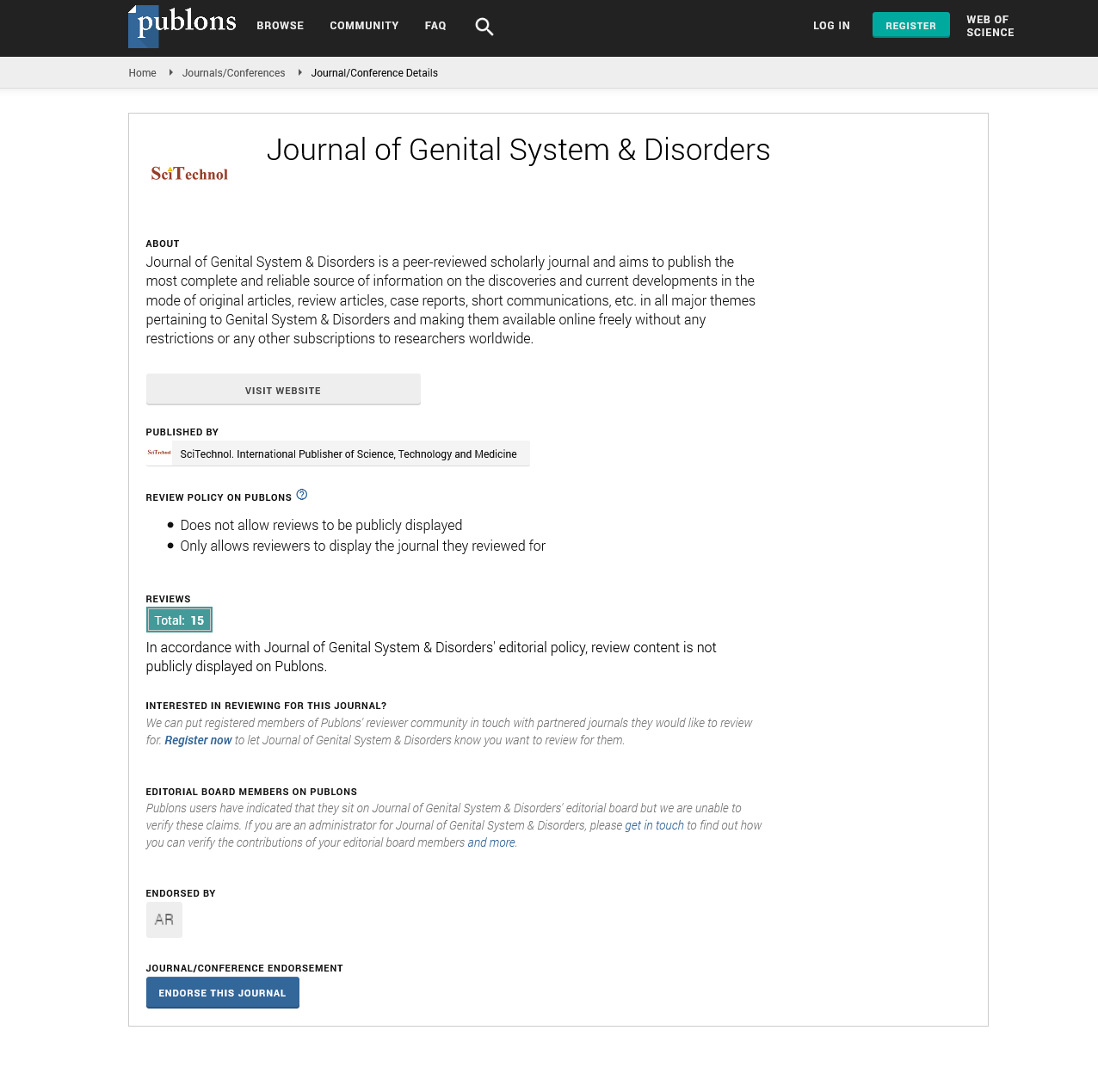Opinion Article, J Genit Syst Disord Vol: 12 Issue: 2
Reproductive Technology: Advancements and Ethical Considerations in Assisted Reproduction
Ahmet Polexa*
1Department of Urology, Necmettin Erbakan University, Konya, Turkey
*Corresponding Author: Ahmet Polexa,
Department of Urology, Necmettin
Erbakan University, Konya, Turkey
E-mail: dr.polexaahmet@gmail.com
Received date: 22 May, 2023, Manuscript No. JGSD-23-107307;
Editor assigned date: 24 May, 2023, PreQC No. JGSD-23-107307 (PQ);
Reviewed date: 08 June, 2023, QC No. JGSD-23-107307;
Revised date: 16 June, 2023, Manuscript No. JGSD-23-107307 (R);
Published date: 26 June, 2023 DOI: 10.4172/2325-9728.1000281
Citation: Polexa A (2023) Reproductive Technology: Advancements and Ethical Considerations in Assisted Reproduction. J Genit Syst Disord 2023, 12:2.
Description
Reproductive technology encompasses a range of techniques and procedures that assist individuals and couples in achieving pregnancy when natural conception is challenging or not possible. These technologies have evolved significantly over the past few decades, providing new options and possibilities in the field of assisted reproduction.
Assisted reproductive techniques
In Vitro Fertilization (IVF): IVF involves the retrieval of eggs from the ovaries, fertilization with sperm in a laboratory setting, and the subsequent transfer of embryos into the uterus. IVF has revolutionized infertility treatment and offers options for individuals with various reproductive challenges, such as blocked fallopian tubes, low sperm count, or unexplained infertility. Advancements in IVF techniques, such as Intra Cytoplasmic Sperm Injection (ICSI) and Preimplantation Genetic Testing (PGT), have further improved success rates and enhanced the ability to screen for genetic abnormalities.
Gamete and embryo cryopreservation: Cryopreservation allows the freezing and storage of eggs, sperm, or embryos for future use. It offers options for fertility preservation in individuals undergoing medical treatments that may impact their reproductive function, such as chemotherapy or radiation therapy. Cryopreservation also facilitates embryo banking, enabling the transfer of embryos in subsequent cycles and reducing the need for repeated ovarian stimulation and egg retrieval procedures.
Donor gametes and embryos: Donor gametes (eggs or sperm) or embryos provide options for individuals or couples who are unable to conceive using their own gametes. Donor-assisted reproduction allows individuals to experience pregnancy and parenthood while addressing specific fertility challenges. Donor selection, legal and ethical considerations, and the emotional impact on individuals and families are critical aspects of this assisted reproduction option.
Ethical Considerations in reproductive technology
Multiple pregnancies and selective reduction is one of the ethical concerns in reproductive technology is the increased risk of multiple pregnancies associated with fertility treatments. Multiple pregnancies pose higher risks to both the mother and the babies. The practice of selective reduction, where one or more fetuses in a multiple pregnancy are selectively terminated, raises ethical and moral dilemmas that need to be carefully considered and discussed with patients.
Embryo selection and genetic testing
Advancements in reproductive technology have enabled the selection of embryos based on genetic characteristics. Preimplantation Genetic Testing (PGT) allows the screening of embryos for genetic disorders or chromosomal abnormalities before transfer. While PGT offers the potential to reduce the risk of passing on genetic conditions.
Social and psychological implications
Reproductive technology has societal implications that challenge traditional notions of conception and family structure. The evolving definitions of parenthood, the involvement of third parties (e.g., donors or surrogates), and the potential psychological impact on individuals and families require ongoing dialogue and ethical considerations.
Conclusion
Reproductive technology has transformed the landscape of assisted reproduction, offering hope to individuals and couples facing infertility. Advancements in assisted reproductive techniques have improved success rates and expanded options for patients. However, the ethical considerations surrounding reproductive technology are complex and require careful deliberation. Striking a balance between technological advancements and ethical principles is essential to ensure the responsible and ethical use of reproductive technology while respecting the rights and well-being of individuals and families seeking fertility assistance. Continued research, ethical discussions, and regulatory frameworks are crucial to guide the responsible implementation of reproductive technology and promote positive outcomes for all involved parties.
 Spanish
Spanish  Chinese
Chinese  Russian
Russian  German
German  French
French  Japanese
Japanese  Portuguese
Portuguese  Hindi
Hindi 
